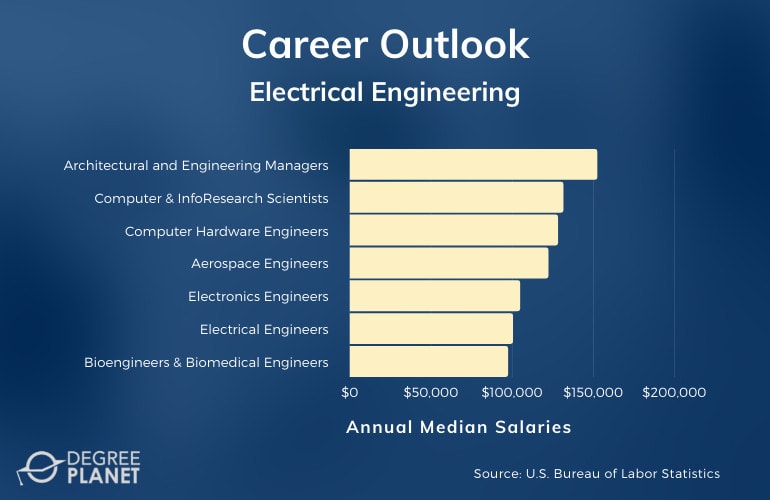If you have an interest in electrical technology and an aptitude for logical problem solving, you may benefit from earning a masters in electrical engineering. You may also find this degree valuable if you want to pursue a senior or leadership role in the electrical engineering field.

There are professional opportunities for electrical engineering experts in a range of industries, from computer electronics and commercial construction to automotive mechanics and telecommunications.
Editorial Listing ShortCode:
Wherever there are organizations that need to create and maintain complex electrical systems, there will likely be work for an electrical engineer.
Online Master’s in Electrical Engineering Programs

Electrical engineering graduate programs are available both in-person and online. The online electrical engineering degree option could be especially convenient if you’re a professional working in the industry. An online masters in engineering program can enable you to increase your technical skill and earning potential without leaving the workforce. A growing number of universities also offer PhD in Electrical Engineering online degree programs.
If you enter this field, you can benefit from advanced science and mathematics skills. Your graduate coursework will typically help you develop expertise in some or all of the following areas:
- Electrical circuit theory
- Physics
- Electronic technology
- Systems design
- Telecommunications
- Signal processing
- Computer drafting
- Instrumentation
- Photonics
- Radio-frequency engineering
- Optics
- Computer engineering
Pursuing an online electrical engineering masters can also allow you to gain skills in a particular technological specialty, such as electromagnetics or biomedical imaging. Your area of specialty may help determine your career prospects after college as well.
Editorial Listing ShortCode:
People who have earned a Master of Science in Electrical Engineering have gone on to work in a wide variety of industries, including robotics, information systems, transportation, medicine, and the military. This degree could also be helpful if you wish to branch out into academia or entrepreneurship.
Common MS in Electrical Engineering Specializations

One of the advantages of seeking a masters degree in electrical engineering is that you have the opportunity to study a chosen specialization in depth. Here are a few of the possible concentrations from which you can choose:
- Bioengineering. With this specialization, you can learn to use electronics for medical applications like artificial body parts and genetic engineering.
- Photonics. If you choose this concentration, you can focus on using photons to generate and control light.
- Circuits. Teachers in this discipline show you how to design electronic circuits for objects like computers, cell phones, and audiovisual equipment.
- Communications and Networking. If this is your specialization, you can learn how to create computer networks and use them to communicate data through the internet.
- Computer Engineering. With a specialization in computer engineering, you can learn how to develop computer hardware and software.
A specialization allows you to tailor your masters degree to your professional interests and goals.
Electrical and Electronics Engineering Careers & Salaries

Depending on your background and degree specialization, there are several different careers you may be able to pursue with a graduate degree in electrical engineering. According to the Bureau of Labor Statistics, here are some of the careers related to the study of electrical and electronics engineering.
| Careers | Annual Median Salaries |
| Architectural and Engineering Managers | $152,350 |
| Computer and Information Research Scientists | $131,490 |
| Computer Hardware Engineers | $128,170 |
| Aerospace Engineers | $122,270 |
| Electronics Engineers (Except Computer) | $104,820 |
| Electrical Engineers | $100,420 |
| Bioengineers and Biomedical Engineers | $97,410 |
| Mechanical Engineers | $95,300 |
| Network and Computer Systems Administrators | $80,600 |
| Electrical and Electronic Engineering Technologists | $63,640 |
Depending on their area of expertise, electrical engineering professionals may be able to find opportunities in electronics, mechanical engineering, bioengineering, aerospace engineering, or computer technology. Some of the most lucrative positions involve working with computers.
Editorial Listing ShortCode:
Some engineers spend their day developing and maintaining equipment or testing it for efficiency and safety. A team leader may have supervisory duties over others in the field.
Master of Electrical Engineering Curriculum & Courses

When you enroll in a master in electrical engineering graduate program, your coursework will reflect your specialization. Here are a few of the classes you may have the opportunity to take:
- Digital and Microprocessor Controller Systems: This class covers how to use microprocessors to control your electronics system.
- Solid-State Devices, Circuits, and Systems: You’ll learn to design devices using semiconductor technology.
- Electromagnetic Fields and Applications: You’ll develop your understanding of electromagnetic fields in this class.
- Telecommunications and Information Systems: This class teaches the latest advances in telecommunications and digital data transfer.
- Nanotechnology Materials and Devices: This class explores nanotechnology applications in electrical systems.
- Systems and Controls: You’ll learn how to design controllers for different application domains.
- Digital Signal and Image Processing: You’ll learn how to analyze, process, and store analog and digital signals in this class.
- Renewable Energy Systems and Vehicular Technology: You can develop your expertise on creating sustainable energy systems in cars and other vehicles.
- Optical Devices and Systems: This class teaches you how to design, analyze, and evaluate new kinds of optical devices.
- Power Systems: You’ll learn how to design and maintain different types of energy devices that power your electrical systems.
Actual curriculum requirements can greatly differ from school to school.
Masters in EE Admissions Requirements

Most schools require these admissions criteria:
- Bachelor’s degree. Most schools require a bachelors related to science or engineering.
- Undergraduate transcript. The minimum GPA required will vary.
- Letters of recommendation. Many institutions will evaluate you based on how your teachers and former employers regard your character and expertise.
- Admissions essay. This is your chance to tell the school about your background, education, and professional goals.
Many schools also require that you submit GRE scores, but there are often exceptions. You can contact your school’s admissions office for more information.
Electrical Engineering Masters Programs Accreditation

If you want your educational background to be respected by future employers, it is strategic to choose an institution that has been approved by a regional accrediting board.
Editorial Listing ShortCode:
Accrediting boards regularly evaluate the curriculum and staff of universities. They require that all accredited schools maintain a certain level of academic rigor and accountability. In the case of a scientific degree, they will also ensure that the technology that’s taught is up-to-date. An engineering program can also undergo evaluation by the Accreditation Board for Engineering and Technology (ABET).
Financial Aid and Scholarships

Graduate school can be costly, but national and local funding sources are available to help qualifying students fund their education. Here are some common forms of aid:
- Scholarships. Your chosen university may offer scholarships in your field, as may outside organizations.
- Work-study programs. Some institutions allow you to work your way through school.
- Student loans. You’re required to pay back federal student loans after you graduate, but they tend to have lower interest rates.
- Employer-sponsored programs. Sometimes, employers will be willing to help subsidize their workers’ education.
In order to apply for any need-based aid, you’ll first fill out the FAFSA.
Is Electrical Engineering a Good Career?

Yes, electrical engineering is a good career for many professionals. Most businesses require advanced electrical systems to run correctly, so electrical engineers are often in demand. The Bureau of Labor Statistics projects 7% job growth for electrical and electronics engineers over the next ten years.
Depending on the specialization you choose, you may be able to find opportunities in a number of different industries. There are careers related to electrical engineering in such diverse fields as telecommunications, medicine, architecture, computer networking, and the military.
What Can You Do with a Master’s Degree in Electrical Engineering?

A master in electrical engineering can open you up to various career opportunities, depending on your specialization.
For example, professionals who specialize in computer engineering may find work as hardware specialists or computer systems programmers. On the other hand, those who focus on microelectronics may decide to work as equipment engineers. With a specialty in power systems, engineers may find opportunities in automation.
Other fields related to electrical engineering include medicine, aerospace engineering, architecture and construction, and telecommunications.
How Long Does It Take to Get a Masters in Electrical Engineering Online Degree?

A masters program generally takes 1 to 2 years to complete with full-time study. If you attend school full-time and year round, a 36 credit hour online engineering program can often be completed in 1 year. Some programs require you to complete a thesis, though, which could add an extra semester.
Many professionals who choose to continue working while pursuing a graduate degree attend part-time, which can often extend your time to completion. If your bachelor’s degree is in a scientific field other than electronic engineering, you may be required to complete additional classes through the course of your studies.
Is It Worth Getting a Masters in Electrical Engineering?
Yes, getting a masters in electrical engineering is worth it for many professionals. The Bureau of Labor Statistics reports that employment for electrical and electronics engineers is expected to grow 7% over the next ten years.
Editorial Listing ShortCode:
Professionals in electrical engineering often find that adding a graduate specialization increases their earning potential and advances their professional qualifications. A graduate degree can also be required for various supervisor positions in the field. A masters in electrical engineering can also enable people to change careers and switch to this lucrative field.
Universities Offering Online Masters in Electrical Engineering Degree Program
Methodology: The following school list is in alphabetical order. To be included, a college or university must be regionally accredited and offer degree programs online or in a hybrid format.

Arizona State University offers an online program for a Master of Science in Engineering in Electrical Engineering. The program requires the completion of 30 credit hours of coursework, and classes are 7.5 to 15 weeks long. The curriculum covers topics such as renewable energy, electromagnetics, and signal processing. Students are also required to pass a comprehensive exam to graduate.
Arizona State University is accredited by the Higher Learning Commission.

Drexel University offers a Master of Science in Electrical Engineering that can be earned online or on campus. The online courses are designed to be highly interactive while also being convenient for working professionals. The program requires the completion of 45 credits. Students may take up to 15 credits’ worth of electives outside of electrical engineering.
Drexel University is accredited by the Middle States Commission on Higher Education.

George Washington University offers a Master of Science in Electrical Engineering. The degree can be earned 100% online. Students in the program can choose a focus area in either Electrical Power and Energy or Communications and Networks. To graduate, students must complete 30 credit hours of coursework.
The George Washington University is accredited by the Middle States Association of Colleges and Schools.

The Georgia Institute of Technology offers an online program for a Master of Science in Electrical and Computer Engineering. Prospective students can apply to begin in the fall or spring. Online students have access to academic advising and all the same resources as on-campus students. Online courses do not have set meeting times.
Georgia Institute of Technology is accredited by the Southern Association of Colleges and Schools Commission on Colleges.

Johns Hopkins University offers a part-time, online program for a Master’s in Electrical and Computer Engineering. Optional concentrations are available in Communications and Networking and Photonics. Students can also choose to take some courses on campus or in a virtual, live format with set meeting times.
The Johns Hopkins University is accredited by the Middle States Commission on Higher Education.

New Mexico State University’s Master of Engineering in Electrical Engineering can be earned 100% online. Students may take classes full-time or part-time. It usually takes 2 to 5 years to finish the program. Specializations are available in Digital Signal Processing, Microelectronics VLSI, Electric energy Systems, Photonics, Electromagnetics, Computer Engineering, and Communications.
NMSU is accredited by the Higher Learning Commission.

North Carolina State University offers an online program for a Master of Science in Electrical Engineering. The program requires the completion of 31 credit hours but does not require a thesis. Applicants must submit GRE scores to apply. Students in the program study topics such as nanoelectronics, photonics, power electronics, power systems, communications, and signal processing.
North Carolina State University is accredited by the Southern Association of Colleges and Schools Commission on Colleges.

Ohio University offers a Master of Science in Electrical Engineering that can be earned 100% online. Most students study part-time and graduate in about 2 years. Coursework includes Engineering Writing, Electronic Navigation Systems, Microwave Theory and Devices, Design of Digital Circuits, Satellite-Based Navigation Systems, and more.
Ohio University is accredited by the Higher Learning Commission.

Oklahoma State University offers an online program for an MS in Electrical Engineering. This is a research-oriented program that includes a thesis requirement, often making it a good fit for someone planning to go on to a doctoral program. OSU’s online courses are designed to be flexible without sacrificing the quality of instruction.
Oklahoma State University is accredited by the Higher Learning Commission.

Pennsylvania State University offers a Master of Engineering in Electrical Engineering. The degree can be earned 100% online, and the curriculum emphasizes hands-on learning and practical applications. Students in the program are required to complete 30 credit hours of coursework but no thesis. The program is designed to be convenient but still provides opportunities for interaction and collaboration.
The Pennsylvania State University is accredited by the Middle States Commission on Higher Education.

Stanford University offers a Master of Science in Electrical Engineering. The online program requires the completion of 45 units of coursework. Students typically enroll part-time and finish in 3 to 5 years. Online students may take some courses on campus. Examples of courses in the program include Electrical Engineering in Biology and Medicine, Database Systems Principles, Wireless Communications, and more.
Stanford is accredited by the Western Association of Schools and Colleges Senior College and University Commission.

Texas A&M University offers a Master of Science in Electrical Engineering in online and on-campus formats. The only difference between the two programs is the delivery format. Students can choose a thesis or non-thesis option. Most of Texas A&M’s online classes do not have set meeting times.
Texas A&M University is accredited by the Southern Association of Colleges and Schools Commission on Colleges.

The University of Arizona offers a Master of Science in Electrical and Computer Engineering that can be earned online. Accepted students can enroll either part-time or full-time. Most students can finish the program within 2 years. The program consists of 30 units of coursework, which may include Advanced Linear Systems Theory, Reconfigurable Computing, Digital Signal Processing, and more.
The University of Arizona is accredited by the Higher Learning Commission.

The University of Arkansas offers a Master of Science in Electrical Engineering that can be earned 100% online. Classes are 8 weeks long, and the full program can usually be completed in 2 years. Students can choose between thesis and non-thesis tracks, and an optional specialization in Power Engineering is available.
The University of Arkansas is accredited by the Higher Learning Commission.

The University of Colorado—Boulder offers a Master of Science in Electrical Engineering. For online students, there as six 8 week terms each year. The program’s courses are self-paced within each term. This is a non-thesis program intended for industry professionals.
The University of Colorado – Boulder is accredited by the Higher Learning Commission.

The University of Idaho’s MS in Electrical Engineering is available both online and on campus. The curriculum covers supercomputing, communication systems, VLSI circuits, digital systems design, electric power systems, integrated circuit design, signal analysis, and more.
The University of Idaho is accredited by the Northwest Commission on Colleges and Universities.

The University of North Dakota offers both a Master of Engineering and a Master of Science in Electrical Engineering. The Master of Science program is the more popular of the two and requires the completion of a thesis. Both programs can be earned on campus or online.
UND is accredited by the Higher Learning Commission.

The University of Southern California offers a Master of Science in Electrical Engineering that can be earned online and on campus. Full-time students can usually finish within 2 years, and part-time students can usually finish within 3 years. Online courses are taught by the same faculty as those on campus. To graduate, students must complete a minimum of 28 units.
The University of Southern California is accredited by the Western Association of Schools and Colleges, the Senior College and University Commission.

The University of Utah offers a Master of Science in Electrical and Computer Engineering. The program is available 100% online to provide flexibility for those who work full-time. Examples of courses in the program include Fundamentals of Micromachining Processes, Power Systems Analysis, and Physics of Nanoelectronics and Related Devices.
The University of Utah is accredited by the Northwest Commission on Colleges and Universities.

Villanova University offers an MS in Electrical Engineering with 5 possible concentrations. Options are System Dynamics and Controls, Signal Processing and Communications, Electric Energy Systems, Electronic Circuits and Systems, or Microwave, Antenna, and Photonic Systems. Students can also create a custom degree plan.
Villanova University is accredited by The Middle States Commission on Higher Education.
Getting Your Electrical Engineering Masters Online

If you have an aptitude for mathematics and analytical thinking, electrical engineering may be a rewarding and lucrative career choice. In this field, you can combine technical knowledge with creative thinking to produce advanced technical innovations in electrical systems.
Earning a master degree in electrical engineering allows you to grow your professional qualifications and focus on a specialization in the field. Many working professionals pursue their masters in electrical engineering online for more flexibility and convenience.
If you’re wanting to begin or advance your career in this lucrative field, you can start exploring accredited masters programs in electrical engineering today.

